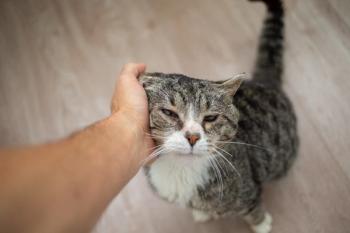
Do you work in an emotional silo?
Compassion fatigue, brownout, burnout, depressionso many conditions, and veterinarians may suffer from any of them. Learn to understand the differences between each and set yourself on a path to more happiness.
Getty Images"The mass of men lead lives of quiet desperation, and go to the grave with the song still in them."
-Henry David Thoreau
Some years ago I heard about a veterinarian who drove to his hospital parking lot one morning and couldn't bring himself to get out of his car and go inside his own practice. His colleague found him in his car crying. As someone who has dealt with brownout and depressive episodes that drove me from practice, affected my personal life and interfered with a life that most people envy, I can tell you such an extreme emotional response didn't just happen. It built up and evolved over years until the emotional dam broke.
Building the dam
Over my years in the profession I've known veterinarians who couldn't face another day and yet had few options. While many veterinarians experience high job satisfaction, many-including myself-have asked, “Is that all there is?” Some resolve their issues and move through them. Some leave the profession. Some struggle with disappointment and disenchantment and even depression. Some resort to the ultimate outlet and end their own lives.
Veterinary medicine is in many ways a lonely life. Veterinarians often work in emotional silos, in small groups with few peers and limited support outlets. With few emotional outlets and even less emotional support, veterinarians seem to internalize. Perhaps it's because the profession has historically been a male-dominated profession, leading to a bit of professional machismo. But regardless, we're often surprised when we learn a colleague is struggling, self medicating or simply coming apart at the seams.
I can remember feeling that no success was enough. No matter what my clients said I wasn't good enough. One shortfall equated with total failure. The reality is people don't often talk about their issues. The result: Feelings get stuffed in a bag that either bursts or becomes too heavy to carry.
Interestingly, older veterinarians dealt with similar emotions but believed it was a feeling only they knew. Today we know that many health care professionals frequently deal with the same demons. Some refer to burnout, some call it brownout. Increasingly it's referred to as compassion fatigue. Let's take a closer look at some of the terms we use to describe the conditions we may face working in a profession that can be emotionally draining:
Compassion fatigue
Compassion fatigue is experienced by those helping people or animals in distress; it's characterized by preoccupation with the suffering of those beings and wishing they could do more. It can create secondary stressors for the caregiver.
Studies have shown that people who are attracted to caregiving professions often enter the field already compassion fatigued or almost inappropriately focused on providing care for the needs of others before caring for their own needs.
What about my needs? Left unresolved, things usually get worse and the response becomes a continuum from “a bad day” to so-called compassion fatigue, which can lead to brownout. Brownout can develop into burnout, depression, emotional blackout and a sense of hopelessness. At some point the solutions can become extreme, including suicide.
Studies confirm that caregivers experience a high level of compassion fatigue. Day in, day out, workers struggle to function in care giving environments that constantly present emotional challenges. Unprepared, unbalanced and with few guidelines, veterinarians are prime candidates for emotional fatigue.
Brownout
Life coaches and business psychologists often talk about brownout, which is a sort of a “burnout light.” Affected professionals become disengaged, demotivated and often lose interest in their jobs.
It goes beyond work. Brownout often creeps into your home life. Individuals become withdrawn and passive-aggressive. I recall feeling emotionally drained, exhausted, overloaded and down in the dumps with no energy. Increasingly practice became frustrating and disenchanting. I became cynical towards work and colleagues. Outwardly I was doing great but inside I was isolated and disengaged.
"I recall feeling emotionally drained, exhausted, overloaded and down in the dumps with no energy. Increasingly practice became frustrating and disenchanting. I became cynical towards work and colleagues. Outwardly I was doing great but inside I was isolated and disengaged."
Indications of brownout
1. Working on “autopilot” but without any real interest in your job. Days lack stimulation or challenge and seem to drag by. At the end of the day you feel a lack of completion.
2. There is no vision of your own future. You are an obstruction to change. You make excuses for yourself. Minor issues become major.
3. You are obsessed with your email's communication tools, not communicating. Your health suffers. Your diet is poor; your sleep patterns are bad. Exercise is out of the question. You've lost your sense of humor and are argumentative and even aggressive with others. Your family life is suffering. You have little time for friends or family. Your TV and laptop are your new best friends. You blame your boss and coworkers for their “moods.”
As the name suggests, brownout is not as serious as burnout, but it's much more prevalent. It's been estimated that 5 percent of business exeutives experience burnout, while 40 percent suffer from brownout. Left unaddressed, brownout may lead to burnout and may progress on to clinical depression.
Burnout
Burnout is a term often misapplied to situations of brownout and compassion fatigue. Burnout is a term that is much like PTSD. It's associated with having experienced things beyond what most of us could cope with … beyond imaginable. First responders, EMTs, trauma nurses and physicians-people who experience extreme work stress and anxiety because they're responsible for life-and-death decisions. They see and hear and feel terrors that most of us can't imagine.
Depression
With depression, negative thoughts and feelings aren't just restricted to work but spread to all areas of life. Extreme symptoms of depression are: low self-esteem, hopelessness and even suicidal tendencies. It affects everyday tasks at work, at home or when caring for family members. Inwardly people who are depressed become negative, find it hard to concentrate, are listless and lack creativity.
Does one thing lead to another?
There are a lot of similarities along the spectrum.
It can be very difficult to determine where compassion fatigue becomes brownout, where brownout becomes burnout and where any of these conditions become depression.
What can you do if you experience these feelings or know someone who is?
The key to breaking this chain is to seek help and support as soon as possible. If you sense that you're suffering from compassion fatigue, chances are excellent that you are. Your path to wellness begins with one small step: awareness. With the appropriate information and support, you can embark on a journey of self-awareness and discovery. Healing begins by employing such simple practices as regular exercise, healthy eating habits, enjoyable social activities, journaling and restful sleep.
You are not alone. Seek and accept help from family, friends and professionals.
What affects us affects others. We all deserve to be happy.
“No man is an island, entire of itself ... any man's death diminishes me, because I am involved in mankind; and therefore never send to know for whom the bell tolls; it tolls for thee."
-John Donne
Dr. Michael Paul is a nationally known speaker and columnist and the principal of Magpie Veterinary Consulting. He lives in Anguilla in the British West Indies.
Newsletter
From exam room tips to practice management insights, get trusted veterinary news delivered straight to your inbox—subscribe to dvm360.






